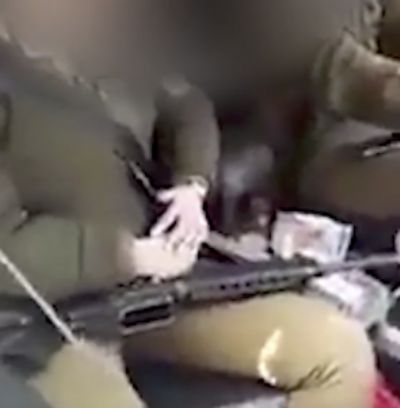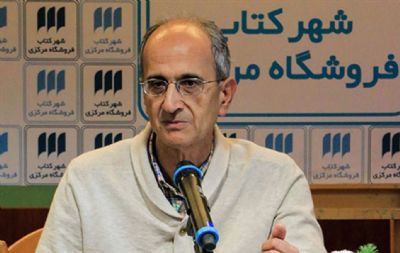Share
What's New
Resources updated Monday, February 12, 2018
February 12, 2018

"Congress is laying the groundwork to remove America from a United Nations human rights body that lawmakers claim uses American taxpayer funds to unduly target Israel for criticism and promote anti-Semitism, according to officials familiar with the effort.
A new congressional resolution gathering support among lawmakers calls out the U.N. Human Rights Council, or UNHRC, for what many allege is its virulently anti-Israel bias and urges the body to enact massive reforms or face a cut off of millions of U.S. taxpayer dollars.
Rep. Joe Wilson (R., S.C.), a member of the House Foreign Affairs Committee, is spearheading the resolution, which puts the UNHRC on notice that its targeting of Israel could lead the United States to remove itself from the body and to consider cutting off some $23 million in funding.
The effort comes amid a push by not just the UNHRC but also a number of other U.N.-affiliated bodies to target Israel for criticism and promote boycotts of the Jewish state, an effort that many describe as anti-Semitic in nature...
Anne Bayefsky, a human rights scholar and head of the Touro College Institute on Human Rights and the Holocaust, said the U.N. efforts to blacklist American companies doing business with Israel is reason enough to withdraw from the organization..."
Kredo: Congress Laying Groundwork to Boycott U.N. Body After Rash of Anti-Israel Measures Article

Two Israeli soldiers came under attack, getting pelted with rocks and beaten by a mob, after they accidentally drove their military car into the Palestinian city of Jenin in the northern West Bank on Monday, the army said.
In the attack, one of the soldiers' guns was stolen by the rioting Palestinians, according to the Israel Defense Forces.
The army said forces were searching the area for the weapon.
When the two soldiers, a man and a woman, drove into the city on Monday afternoon, local residents began attacking the car with rocks and chairs, breaking the windows and bloodying the soldiers.
Before the riot began, the female soldier could be seen holding an M-16 assault rifle, without a magazine, across her lap.
Videos from the scene showed swarms of people surrounding the vehicle and clawing at the soldiers inside it, including one person who appeared to try grabbing the female soldier by her hair.
She was taken to a nearby Israeli hospital for treatment, the army said.
Palestinian security forces could be seen in the videos protecting the Israeli soldiers during the riot. They also helped them leave the area.
Deputy Governor of Jenin Kamal Abu al-Rub said the IDF vehicle was attacked by Palestinians for "nationalist motives."
He confirmed PA policemen rushed to the scene to secure the safe exit of the vehicle from the city.
The IDF said the car was brought out of the city through coordination with the Civil Administration, a Defense Ministry unit that acts as a liaison between the military and Palestinians.
Markings on their vehicle indicated that they were noncombat soldiers from a support unit.
An IDF spokesperson said it was not immediately clear how they accidentally drove into the Palestinian city. In the past, this has happened because soldiers relied on navigation applications.
"The event is being investigated," the army said.
Palestinian Mob Attacks Two IDF Soldiers After They Made a Wrong Turn Document

An Iranian-Canadian university professor detained in Tehran has died in custody, activists and a family member said Sunday, marking the latest suspicious death of a detainee in Iran after a crackdown on dissent following nationwide protests.
They identified the professor as Kavous Seyed-Emami, a 63-year-old professor of sociology at Imam Sadeq University in Tehran and the managing director of the Persian Heritage Wildlife Foundation. His son and the New York-based Center for Human Rights in Iran say that authorities told Seyed-Emami's family that he committed suicide in custody, something they described as suspicious following other detainee deaths.
Tehran prosecutor Abbas Jafari Dolatabadi later confirmed the professor's death on Sunday, saying he had been detained in an alleged espionage ring. The prosecutor on Saturday announced the ring, saying it had targeted people who were "implementing scientific and environmental projects" to collect information on "strategic areas."
"He knew there were a lot of confessions against him and he also confessed himself," Dolatabadi was quoted as saying Sunday by the semi-official ILNA news agency. "Unfortunately, he committed suicide in prison."
The professor's son, musician Ramin Seyed-Emami who performs under the stage name King Raam, wrote on Instagram that his father had died following his arrest on Jan. 24.
"They say he committed suicide. I still can't believe this," he wrote.
Global Affairs Canada, the country's Foreign Ministry, said it was aware of reports of Seyed-Emami's death. An Iranian reformist lawmaker, Mahmoud Sadeghi, tweeted that he failed to get information on Seyed-Emami's death despite calls to "related officials."
"Some of them refused to comment, some others said we pursued (but) failed to get information," the lawmaker wrote.
Iran entered the New Year with nationwide protests sweeping across 75 cities and towns. The demonstrations initially focused on Iran's poor economy despite its nuclear deal with world powers, but quickly spiraled into chants directly challenging Supreme Leader Ayatollah Ali Khamenei and its theocratic government.
Authorities arrested nearly 5,000 people in the crackdown that followed, according to Alireza Rahimi, an Iranian lawmaker. At least 25 people were killed in clashes surrounding the demonstrations.
Activists say they have concerns about Iran's prisons and jails being overcrowded and dangerous, pointing to allegations of torture, abuse and deaths that followed the mass arrests during Iran's 2009 Green Movement protests. Since the most-recent protests, activists have said they also remain concerned by reported suicides within Iran's prison system.
Analysts and family members of dual nationals and others detained in Iran have suggested that hard-liners in the Islamic Republic's security agencies use the prisoners as bargaining chips for money or influence. A U.N. panel in September described "an emerging pattern involving the arbitrary deprivation of liberty of dual nationals" in Iran, which Tehran denies.
Iran does not recognize dual nationalities, so those detainees cannot receive consular assistance.
Others with ties to the West detained in Iran include Chinese-American graduate student Xiyue Wang, who was sentenced to 10 years in prison for allegedly "infiltrating" the country while doing doctoral research on Iran's Qajar dynasty. Iranian-Canadian national Abdolrasoul Dorri Esfahani, a member of Iran's 2015 nuclear negotiating team, is believed to be serving a five-year sentence on espionage charges. Nazanin Zaghari-Ratcliffe, a British-Iranian woman, also is serving a five-year prison sentence for allegedly planning the "soft toppling" of Iran's government while traveling with her young daughter.
Iranian businessman Siamak Namazi and his 81-year-old father Baquer, a former UNICEF representative who served as governor of Iran's oil-rich Khuzestan province under the U.S.-backed shah, are both serving 10-year sentences on espionage charges. Iranian-American art dealer Karan Vafadari and his Iranian wife, Afarin Neyssari, recently received 27-year and 16-year prison sentences respectively.
Iranian-American Robin Shahini was released on bail last year after staging a hunger strike while serving an 18-year prison sentence for "collaboration with a hostile government." Shahini is believed to still be in Iran.
Also in an Iranian prison is Nizar Zakka, a U.S. permanent resident from Lebanon who advocated for internet freedom and has done work for the U.S. government. He was sentenced to 10 years last year on espionage-related charges.
Former FBI agent Robert Levinson, who vanished in Iran in 2007 while on an unauthorized CIA mission, remains missing as well. Iran says that Levinson is not in the country and that it has no further information about him, though his family holds Tehran responsible for his disappearance.
Iranian-Canadian Dies in Custody in Tehran After Crackdown Document
